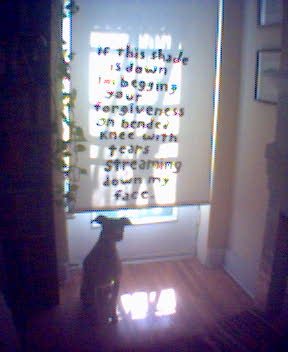And in this dour spirit, I find it no surprise whatsoever that my favorite show on television is The Wire.

If you're reading this now, I hope this is not the first time you have heard of this show. If so, I'm sorry, because you've missed out on some fantastic writing, acting and dedication to the craft of storytelling. But if you've never heard of the show, I'm not surprised. The Wire has been plagued with low audience figures since it was first conceived (such is the plight of many intelligent programs). The audience it does retain, however, is a rabid group of similarly addicted viewers like myself.
The micro view of The Wire is that it is a modern crime drama, depicting the two sides of the drug war in America. You see the story unfold from both the police perspective and the criminal perspective. And there are "good guys" and "bad guys" on both sides, for certain. It doesn't paint a very pretty picture of the world - there are drug dealers who you actually find yourself rooting for and there are police officers that embody the worst qualities humanity has to offer. And there are thousands of gray areas in between of course. It's not the prettiest picture, but it is a compelling one.
The macro view... well, that's where things get really dark.
In its essence, The Wire is really the story of the decline of civilization - or, at least, American civilization. It tells the tale of political, municipal, administrative corruption that occurs in surround sound at all times. These forces align to create a block that prevents progress, discourages independent thinking and alienates both the working class and civilians in general. This confluence of negative forces perpetuates societal norms and dysfunction that extends to both the street-level drug game and the political powers at the highest level of government.
Just give me a second to catch my breath here.... phew.
The Wire has illustrated this systematic degradation on a variety of intertwining levels:
Season 1 exposed the street-level impact of the drug trade, as well as the bureaucratic webs that even the most dedicated of police officers have to negotiate in order to do good police work. Often, both systems work profoundly against their own workforce.
Season 2 shed light on the death of the working class. These are the people that once comprised the "salt of the earth" and did the work that made industry and modern civilization happen. In this case, it is shown as dockworkers. Men and women who start with honest intentions, but eventually are drawn into the tangled webs of criminal activity and survivalist behavior. In other words, they mimic similar patterns to the cop/criminal structure exposed in Season 1.
Season 3 again goes back to a street level perspective, but with a keen focus on how street-level issues impact the political game. Here we see the genesis of a political campaign striving for a "new day" in Baltimore. Guess what? It never happens. When one police captain takes the initiative to legalize drugs or as he states it "elects to ignore them," even the best of political intentions wash away in the fray, for the sake of self-preservation.
Season 4, perhaps the most unnerving of all so far, incorporates all the levels of the story so far - the cops, the criminals, the politicians and then extends the story to a new audience: the next generation. Or, in other words, it examines the failure of the education system, which does its part to perpetuate the continued divergence and struggles among the various factions of society.
Season 5 purports to add yet another level of noise to the story: the media.
Speaking of Season 5, it officially begins this Sunday, January 6th. I had the opportunity to watch the season premiere and it did not disappoint. If you have never seen the Wire, and you've read this far, I invite you to check it out this season, because it is the final season. Rather than ramble on into oblivion, the powers behind The Wire have elected to bow out gracefully, after telling a gritty, compelling and truly inspiring story, completely on its own terms.
I know the description above probably doesn't sound like much of a fun time, but I promise you, once you've sunk your teeth into this show, you won't be able to stay away. It's absolutely enthralling. And as the original slogan for the show suggested, I would agree: Listen Carefully.
The Wire airs Sundays at 9pm on HBO.
For the uninitiated, or the simply curious, following are a few links that may be of interest:
An overview on the series from creator David Simon.
A series of videos from a talk David Simon Gave at Loyola University in Baltimore.
Video 1
Video 2
Video 3
An excellent story on the Wire from The New Yorker.
And last, but certainly not least, just to show that all of this does have a sense of humor from time to time, here is a clip of one of the best scenes from the entire series. Detectives Bunk and McNulty investigate a crime scene and identify the method in which a shooting victim was attacked:


No comments:
Post a Comment